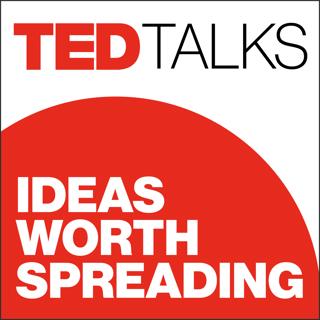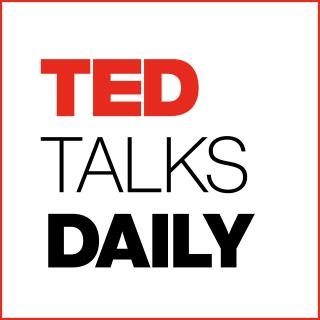
How fake handbags fund terrorism and organized crime | Alistair Gray
What's the harm in buying a knock-off purse or a fake designer watch? According to counterfeit investigator Alastair Gray, fakes like these fund terrorism and organized crime. Learn more about the trillion-dollar underground economy of counterfeiting -- from the criminal organizations that run it to the child labor they use to produce its goods -- as well as measures you can take to help stop it. "Let's shine a light on the dark forces of counterfeiting that are hiding in plain sight," Gray says.Interested in learning more about upcoming TED events? Follow these links:TEDNext: ted.com/futureyouTEDAI Vienna: ted.com/ai-viennaTEDAI San Francisco: ted.com/ai-sf Hosted on Acast. See acast.com/privacy for more information.
6 Des 201712min

The brain benefits of deep sleep -- and how to get more of it | Dan Gartenberg
There's nothing quite like a good night's sleep. What if technology could help us get more out of it? Dan Gartenberg is working on tech that stimulates deep sleep, the most regenerative stage which (among other wonderful things) might help us consolidate our memories and form our personalities. Find out more about how playing sounds that mirror brain waves during this stage might lead to deeper sleep -- and its potential benefits on our health, memory and ability to learn.Interested in learning more about upcoming TED events? Follow these links:TEDNext: ted.com/futureyouTEDAI Vienna: ted.com/ai-viennaTEDAI San Francisco: ted.com/ai-sf Hosted on Acast. See acast.com/privacy for more information.
5 Des 20176min

A Republican mayor's plan to replace partisanship with policy | GT Bynum
Conventional wisdom says that to win an election, you need to play to your constituencies' basest, most divisive instincts. But as a candidate for mayor of Tulsa, Oklahoma, G.T. Bynum decided to skip the smear campaigns and trash talk and instead focus on results. He told Tulsa's voters exactly what he wanted to accomplish if elected and gave them transparent ways to measure his success, and it led him to win the election. In a hopeful, funny talk, Bynum shares how he's now using data and evaluation to tackle his city's most pressing issues -- and why we need to set aside our philosophical disagreements and focus on those aspirations that unite us.Interested in learning more about upcoming TED events? Follow these links:TEDNext: ted.com/futureyouTEDAI Vienna: ted.com/ai-viennaTEDAI San Francisco: ted.com/ai-sf Hosted on Acast. See acast.com/privacy for more information.
30 Nov 201713min

The new generation of computers is programming itself | Sebastian Thrun and Chris Anderson
Educator and entrepreneur Sebastian Thrun wants us to use AI to free humanity of repetitive work and unleash our creativity. In an inspiring, informative conversation with TED Curator Chris Anderson, Thrun discusses the progress of deep learning, why we shouldn't fear runaway AI and how society will be better off if dull, tedious work is done with the help of machines. "Only one percent of interesting things have been invented yet," Thrun says. "I believe all of us are insanely creative ... [AI] will empower us to turn creativity into action."Interested in learning more about upcoming TED events? Follow these links:TEDNext: ted.com/futureyouTEDAI Vienna: ted.com/ai-viennaTEDAI San Francisco: ted.com/ai-sf Hosted on Acast. See acast.com/privacy for more information.
30 Nov 201724min

Fashion has a pollution problem -- can biology fix it? | Natsai Audrey Chieza
Natsai Audrey Chieza is a designer on a mission -- to reduce pollution in the fashion industry while creating amazing new things to wear. In her lab, she noticed that the bacteria Streptomyces coelicolor makes a striking red-purple pigment, and now she's using it to develop bold, color-fast fabric dye that cuts down on water waste and chemical runoff, compared with traditional dyes. And she isn't alone in using synthetic biology to redefine our material future; think -- "leather" made from mushrooms and superstrong yarn made from spider-silk protein. We're not going to build the future with fossil fuels, Chieza says. We're going to build it with biology.Interested in learning more about upcoming TED events? Follow these links:TEDNext: ted.com/futureyouTEDAI Vienna: ted.com/ai-viennaTEDAI San Francisco: ted.com/ai-sf Hosted on Acast. See acast.com/privacy for more information.
29 Nov 201713min

The future of good food in China | Matilda Ho
Fresh food free of chemicals and pesticides is hard to come by in China: in 2016, the Chinese government revealed half a million food safety violations in just nine months. In the absence of safe, sustainable food sources, TED Fellow Matilda Ho launched China's first online farmers market, instituting a zero-tolerance test towards pesticides, antibiotics and hormones in food. She shares how she's growing her platform from the ground up and bringing local, organically grown food to the families that need it.Interested in learning more about upcoming TED events? Follow these links:TEDNext: ted.com/futureyouTEDAI Vienna: ted.com/ai-viennaTEDAI San Francisco: ted.com/ai-sf Hosted on Acast. See acast.com/privacy for more information.
28 Nov 20175min

How we're using drones to deliver blood and save lives | Keller Rinaudo
Keller Rinaudo wants everyone on earth to have access to basic health care, no matter how hard it is to reach them. With his start-up Zipline, he has created the world's first drone delivery system to operate at national scale, transporting blood and plasma to remote clinics in East Africa with a fleet of electric autonomous aircraft. Find out how Rinaudo and his team are working to transform health care logistics throughout the world -- and inspiring the next generation of engineers along the way.Interested in learning more about upcoming TED events? Follow these links:TEDNext: ted.com/futureyouTEDAI Vienna: ted.com/ai-viennaTEDAI San Francisco: ted.com/ai-sf Hosted on Acast. See acast.com/privacy for more information.
28 Nov 201715min

The science of cells that never get old | Elizabeth Blackburn
What makes our bodies age ... our skin wrinkle, our hair turn white, our immune systems weaken? Biologist Elizabeth Blackburn shares a Nobel Prize for her work finding out the answer, with the discovery of telomerase: an enzyme that replenishes the caps at the end of chromosomes, which break down when cells divide. Learn more about Blackburn's groundbreaking research -- including how we might have more control over aging than we think.Interested in learning more about upcoming TED events? Follow these links:TEDNext: ted.com/futureyouTEDAI Vienna: ted.com/ai-viennaTEDAI San Francisco: ted.com/ai-sf Hosted on Acast. See acast.com/privacy for more information.
27 Nov 201718min






















